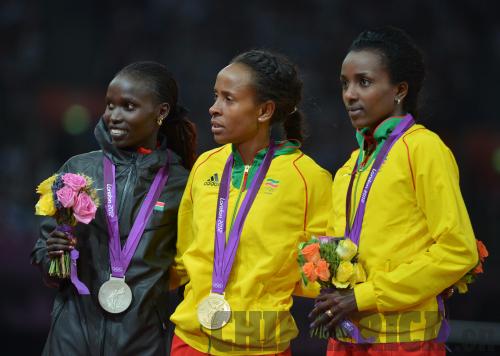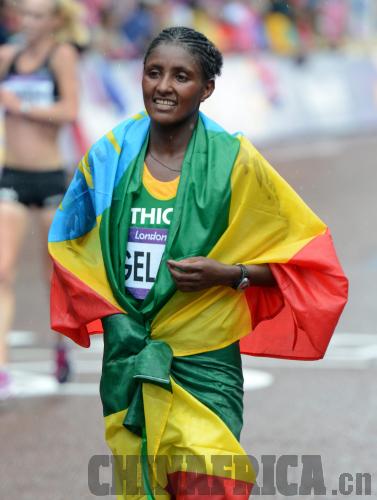|
|

|
|
High Spirits: Teams from Africa collect 34 medals at the London Olympics XINHUA |
On the evening of August 12, the 30th London Summer Olympic Games came to a close when the flame at the Olympic Stadium was extinguished as each country received one of the cauldron's 204 copper petals. In this year's Olympics, 10,500 athletes, including nearly 900 African athletes, participated in 302 medal events in all 26 sports.
African countries still maintained their competitive edge in the track and field, and they competed for medals mainly in the long and middle distance battlefield. In the 10,000m race, African female runners picked up all of the gold, silver and bronze medals; Tirunesh Dibaba from Ethiopia even broke the world record with a time of 30 minutes 20.75 seconds. Tiki Gelana of Ethiopia captured the gold medal in the women's marathon in an Olympic-record time of two hours, 23 minutes and seven seconds, and Team Kenya won the men's 3,000m steeplechase again for the eighth consecutive Olympic Games.
In addition to Africans' innate physical talent as displayed on the racetrack, the growing economy of African countries in recent years has provided greater resources for their sports development. The investment in sports brought them victory in this year's Olympics: South Africa won three gold medals in swimming, while Gabon won their first Olympic medal - a silver in taekwondo.
The continent was also represented by strong athletes in soccer, basketball, judo, boxing, weightlifting and other events. Athletics have gradually taken a stronger presence on the African continent, with each area competitive in different events – swimming in Southern Africa, long- and middle-distance events in East Africa, sprinting and boxing in West Africa and judo in North Africa.
African countries also experienced some disappointment in the London Olympics. The results of Kenya and Ethiopia were less stellar than the countries had hoped, as they won only five gold medals in long- and middle-distance events in contrast to the eight they received in the Beijing Olympics four years ago. In addition, as Africa's most populous country, Nigeria sent a 51-member delegation to London, but returned home empty-handed.
 |
|
Record Breaker: Tiki Gelana of Ethiopia sets an Olympic record in the marathon |
However, there can only be one champion of each event, and medals are not the only marker of success. The Olympic spirit demonstrated by the athletes' strong will and their passion for their sports have left a deep impression on people's memories.
Djibo Issaka from Niger was touted as the underdog favorite of Olympic rowing. Incredibly, he learned how to row only three months before the Games. Issaka finished nearly over one minute behind the rest of other competitors and crawled to the finish in last place in a single sculls repechage. "You can do it," screamed the announcer. Some in the packed grandstands were on their feet, roaring as he made it to the finish line. He also drew one of the biggest rounds of applause of the day.
South African Oscar Pistorius, the double-amputee known as "blade runner," inspired everyone with his gutsy performance in the semi-finals of the 400m and the final 400m relay, joining the race with his blade-shaped artificial limbs made of carbon fiber. Though he lost the games, he won the hearts of the world. Over 80,000 people in the audience welcomed him with the warmest applause.
Over 100 years have passed since Africa participated in the Olympic Games for the first time in 1908, yet the Olympic Games have never come to the continent. During a visit to Nairobi on May 12, 2010, International Olympic Committee President Jacques Rogge said he believed African countries could host the Olympic Games one day. The hope is that the Olympics can arrive in Africa as early as possible and give Africa its due moment of glory.
On August 8, 2012, Kenyan Prime Minister Raila Odinga announced that Nairobi, the capital of Kenya, plans to make a bid for the 2024 Olympics, in hopes that people will pay more attention to Africa's sports development. So far, Nairobi will become the third African city to bid to host the Olympics after Egypt's Cairo and South Africa's Cape Town.
|